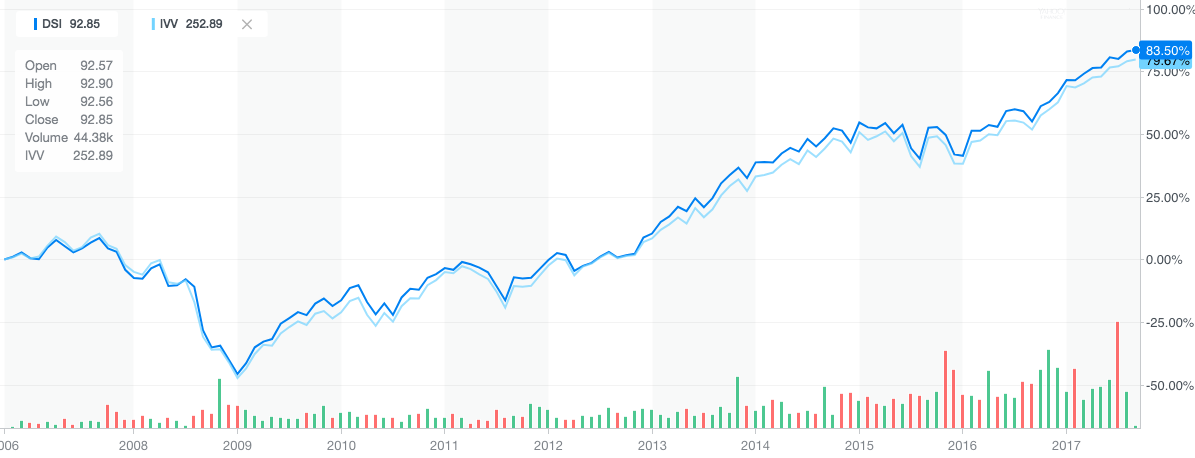Socially Responsible Investing 101
- December 11, 2017
- by Emily

The idea behind socially responsible investing isn’t new: Methodists and Quakers started preaching against profiting from (ie investing in) any business that earned money through alcohol, tobacco, weapons or slavery. Money is a type of power, and allocating our money towards businesses that are in line with our values is a way to connect our investments to a sense of purpose other than just generating returns. The desire to use money to further our values is by no means a modern invention.
If you’d like to start investing in stocks but balk at the idea of your cash being used to commit environmental atrocities or by a company with a poor human rights record, here are some tips for getting started with socially responsible investing.
Socially Responsible Mutual Funds
The easiest way to get started with socially responsible index funds is to invest in mutual funds or exchange traded funds (EFTs) that align with your values. These funds use certain screening criteria to determine which companies to include or exclude. There are hundreds of different mutual funds and EFTs that are considered socially responsible, but each has slightly different screening criteria. You can invest in a fund that focuses on environmental responsibility, a fund that only invests in companies with a certain number of women in leadership positions or a fund that scrutinizes human rights records. There are also general "socially responsible" funds that screen companies on a variety of criteria.
The Domini 400 Social Index, now called the MSCI KLD 400 Social Index (ticker Symbol DSI), is one of the most well-known and oldest socially responsible mutual funds, but there are many others to choose from.
Returns and Fees
The two primary criticisms of socially responsible funds is that the returns aren’t as good as a "regular" mutual fund, and that the management fees are higher.
Let’s look at the returns first. While each fund is different, in fact the MSCI KLD 400 Social Index Fund (ticker Symbol DSI) has had returns that are almost identical to the iShares Core S&P 500 ETF (ticker symbol IVV). The S&P 500’s 10-year return was 7.13%, while the MSCI KLD 400’s return was 6.87%. In the graph below that compares the past 10 years, they track each other very closely:

Each fund is different though, and may not be as closely correlated with the S&P 500. For example a fund that only invests in renewable energy companies could have a much lower rate of return… or a much higher rate of return, depending on how the industry has fared in the past several years.
What is true is that socially responsible funds have higher management fees, so your overall investment returns will be slightly lower if the two funds have exactly the same return rates. In the case of DSI the expense ratio is 0.50% and IVV’s is 0.04% (which is about as low as an individual investor can get). A difference fees like that can make a large difference in terms of compounding over time. For more on what expense ratios are and why they matter to you, see our articles What Is An Expense Ratio Part 1 and The Golden Rule Keeping Your Investment Costs Low.
How Social Responsible Investing Can Make a Difference
If you’re just investing $1,000, it’s easy to feel like your money can’t possibly make a difference. But when investors work together, they can actually make a difference. Here’s some concrete examples:
- When both individual and institutional investors divested from companies doing business in South Africa, it helped lead to the end of apartheid. Similar divestment campaigns have targeted fossil
- Mutual funds can and do engage in shareholder advocacy on behalf of investors, who otherwise wouldn’t have a large enough share of the company to get a voice at shareholder meetings. Shareholder advocacy can change business practices, and shareholder activism related to climate change has led companies to take actions they might otherwise not have.
The bottom line is that choosing an investment strategy is not just about finding the absolute maximum returns on your investments, just like most people don’t choose a career based exclusively on the pay. It’s possible to invest your money in a way that aligns with your values and still get a good return. It will, however, likely require somewhat more research to figure out which fund(s) to invest in. That’s not necessarily a bad thing: being an involved, educated investor is better in the long run.








